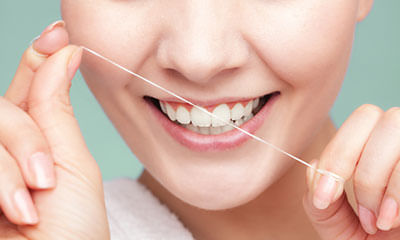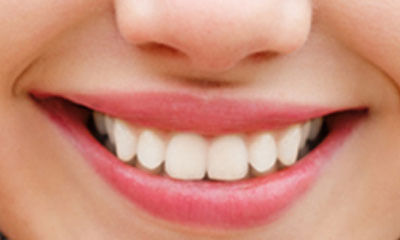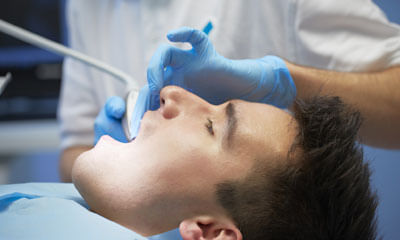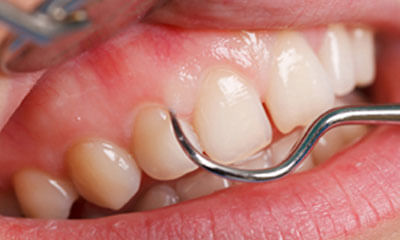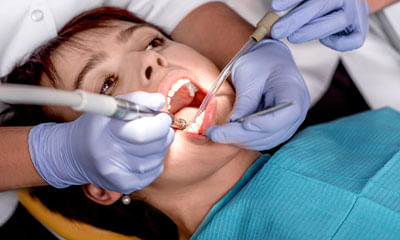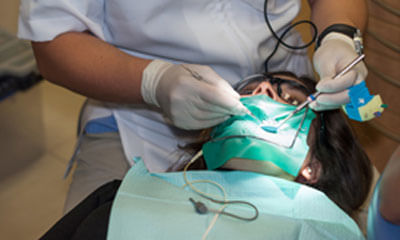Swollen Gums On Right Side Of Mouth
My gum was swollen, at the back, very end after molar. I had a lot of pain. Today it’s decreased, not gone. I’ve done sa ...
Ask Free Question
Wisdom teeth usually make their appearance between the ages of 17 and 21, though it's possible for them to push through earlier or later. Referred to as your "third molars," these four teeth begin to push through the skin like any other tooth, which can cause pain. However, wisdom teeth are much more likely to grow in at an incorrect angle – even sideways – causing impaction that can radiate this pain to the teeth in front of it. Kindly get it extracted as soon as possible.
My gum was swollen, at the back, very end after molar. I had a lot of pain. Today it’s decreased. I’ve done saltwater ri ...
Ask Free Question
It can cause due to dental caries or gum disease. Visit a good dentist, after check up anyone can say the reasons. Don't neglect it.
I'm experiencing gum recession and swollen and red gum diagnosed by stage 1 of peronditites can I use hydrogen peroxide ...
Ask Free Question
Hydrogen peroxide can be used only under the supervision of a professional only. The symptom of bleeding gums warrants referral to a periodontist or an appropriately qualified dental surgeon. - use a soft toothbrush -- and brush properly! brush your teeth for at least two minutes twice a day and after meals. Hard brushing can further damage the soft tissues of your mouth. - floss at least once a day and be sure to floss beyond the gum line to remove more plaque. - control bleeding by applying pressure to the area with a cold compress. - rinse with salt water or hydrogen peroxide to keep the area clean. Avoid mouthwashes that contain alcohol, which can dry out your mouth. - stay away from smoking and other tobacco products, which can aggravate bleeding gums. - eat a balanced diet and limit snacking between meals. Carbohydrates and sugars feed dental plaque. - try an oral irrigation device, commonly known as a "water pick, to clear debris from around the gum line. - you may need deep cleaning along with surgical curettage or gum strengthening procedure. Use pepsodent tooth paste & gum paint for 2 to 3 weeks. Advance procedures can be done with laser. You may consult me in person.
Anyone can help me. My tongue swollen and painful. Lots of taste buds swollen there. My jaw is hurting at the end of the ...
Ask Free Question
I understand you're experiencing discomfort and pain in your mouth and jaw, and I want to help provide some guidance. However, I cannot diagnose medical conditions or offer specific medical advice. It's important to seek professional medical help for accurate diagnosis and proper treatment. With that in mind, here are some general suggestions: seek medical attention: contact your dentist immediately: explain your symptoms and schedule an appointment as soon as possible. They can examine your mouth, diagnose the cause of your pain and swelling, and recommend the appropriate treatment. Consider emergency care if: you have difficulty breathing or swallowing. You have severe facial swelling or redness. You have a high fever. You experience intense, unrelieved pain. Possible causes: swollen taste buds: several factors can cause this, including allergies, irritation from dental appliances, oral thrush, or burning your tongue. Wisdom tooth issues: painful gum inflammation and swelling around wisdom teeth are common, especially if they're impacted or erupting. Tips to manage discomfort: gargle with warm salt water several times a day to soothe pain and swelling. Apply a cold compress to your cheek to reduce swelling and pain. Over-the-counter pain relievers like ibuprofen or acetaminophen can help manage mild pain. Avoid spicy, acidic, or hot foods that may irritate your tongue and mouth. Maintain good oral hygiene: brush and floss gently around the affected area to prevent further infection. Remember: don't try to diagnose yourself or ignore the symptoms. Seek professional medical advice to get a proper diagnosis and treatment plan. Follow the dentist's instructions carefully to ensure proper healing. I hope this information provides some initial guidance and helps you find the right medical care. Wishing you a speedy recovery!
I had deep cavity in my lower back molar but now since few days my gums have started bleeding even with a slight pressin ...
Ask Free Question
1 I understand your concern about the bleeding gums near your deep cavity in the lower back molar. Unfortunately, I cannot provide medical advice or diagnose your situation. However, I can offer some general information and suggest the next steps you should take: possible causes of bleeding gums: inflammation from the deep cavity: the bacteria in the cavity can irritate the surrounding gums, leading to inflammation and bleeding. Gum disease: bleeding gums can also be a symptom of gum disease, which is a separate condition from cavities. What to do: schedule an appointment with your dentist as soon as possible: they can properly assess the situation, take x-rays if necessary, and determine the cause of your bleeding gums. In the meantime, practice good oral hygiene: brush your teeth twice a day with a soft-bristled toothbrush and fluoride toothpaste. Floss daily, being gentle around the area with the bleeding gums. Rinse your mouth with a mouthwash containing fluoride. Avoid any harsh brushing or flossing: this could further irritate the gums and worsen the bleeding. Do not try to self-diagnose or treat the problem: only a dentist can provide the proper diagnosis and treatment. Additional information: deep cavities usually require treatment such as fillings or crowns to prevent further damage and infection. If you have gum disease, your dentist will recommend a treatment plan, which may include professional cleaning, scaling and root planing, or other procedures. Remember, early diagnosis and treatment are crucial for preventing further complications from both cavities and gum disease. I hope this information is helpful. Please don't hesitate to reach out if you have any other questions. Sources dietfoodpro.com/how-to-combat-tooth-sensitivity. Html.
I feel slight pain under left jawline only when I touch it, upon tilting my head backwards I could feel something swolle ...
Ask Free Question
I understand your concern about the swollen and painful area under your left jawline. While I can't provide a definitive diagnosis without a physical examination, I can offer some information and advice that may help: swollen lymph nodes: it's likely that the lump under your jaw is a swollen lymph node. Lymph nodes are part of your immune system and can swell in response to various causes, including infections, allergies, and sometimes, more serious conditions. Swollen lymph nodes due to common infections like the cold or flu usually resolve on their own within a few weeks. However, if the swelling persists for more than two weeks, grows rapidly, becomes hard and fixed, or is accompanied by other concerning symptoms like fever, night sweats, or unexplained weight loss, it's crucial to see a doctor for further evaluation. Gum pain: the pain in your gums while brushing on the lower left jaw could be related to the swollen lymph node, possibly due to inflammation in the surrounding tissues. It could also be a sign of gum disease, a cavity, or another dental issue. If the gum pain persists or worsens, it's essential to schedule an appointment with your dentist for a checkup. Life-threatening: while it's always good to be cautious, it's unlikely that your swollen lymph node is life-threatening, especially given that you haven't experienced any other significant symptoms. Recommendations: monitor the swelling: observe if the lump grows or changes in texture, and take note of any new symptoms like fever, night sweats, or difficulty swallowing. Warm compress: apply a warm compress to the area for 15-20 minutes several times a day to help reduce inflammation and discomfort. Practice good oral hygiene: maintain proper oral hygiene by brushing your teeth twice daily and flossing regularly. This can help reduce gum inflammation and prevent potential dental issues. See a doctor: if the swelling doesn't improve within a few weeks, grows rapidly, becomes hard and fixed, or is accompanied by other concerning symptoms, consult your doctor for a proper diagnosis and appropriate treatment. See a dentist: schedule an appointment with your dentist to assess the gum pain and rule out any dental issues. Remember, I am not a medical professional and this information should not be taken as a substitute for professional medical advice. It's important to seek proper medical attention for accurate diagnosis and treatment. I hope this information is helpful and puts your mind at ease. Please feel free to ask any further questions you may have.
I am 21 years old studying pg at jalandhar not able to chew food properly as my wisdom teeth below swelling occurred pas ...
Ask Free Question
I understand your discomfort with your swollen wisdom teeth preventing you from chewing properly. Here are some suggestions on precautions and medications that might help until you can see a dentist: precautions: avoid hot and cold food: opt for lukewarm or room-temperature foods that are soft and easy to swallow. Examples include mashed potatoes, soups, yogurt, smoothies, and scrambled eggs. Cut your food into small pieces: make chewing easier by cutting your food into bite-sized pieces or even mashing them further. Maintain good oral hygiene: brush your teeth twice a day, floss once a day, and consider using a mouthwash. This will help keep the area clean and prevent further infection. Apply a cold compress: place a cold compress (wrapped in a towel) on your cheek next to the swollen area for 15-20 minutes at a time, several times a day. This can help reduce swelling and pain. Avoid strenuous activity: strenuous activities can increase blood flow and worsen swelling. Stick to light activities and get plenty of rest. Medications (over-the-counter): pain relievers: over-the-counter pain relievers like ibuprofen or acetaminophen can help manage discomfort. Follow the dosage instructions carefully and do not exceed the recommended daily intake. Anti-inflammatory medications: ibuprofen is also an anti-inflammatory medication that can help reduce swelling. Consider using it in addition to a pain reliever for added relief. It's important to see a dentist as soon as possible: a dentist can properly diagnose the cause of the swelling and determine the best course of treatment. They might prescribe antibiotics if an infection is present. Depending on the severity of the situation, they might recommend removing the wisdom teeth, especially if they are causing persistent pain or impacting your quality of life. Additional tips: rinse your mouth with salt water: mix a teaspoon of salt with warm water and gently rinse your mouth several times a day. This can help reduce inflammation and keep the area clean. Avoid smoking and alcohol: smoking and alcohol can irritate the gum tissue and worsen swelling. Stay hydrated: drinking plenty of water helps keep your mouth moist and can aid in the healing process. Remember, these are just suggestions, and it's crucial to prioritize professional medical advice. Seeing a dentist will provide the most accurate diagnosis and treatment plan for your specific situation. I hope this information helps you manage your discomfort until you can visit a dentist. Please get well soon!
I am 34 years old. I have developed a lump over my one tooth that keeps appearing and disappearing. I have gums problem ...
Ask Free Question
Kindly consult a dentist in person for further suggestion. We need more investigations with clinical examination to decide upon treatment. You may need deep cleaning along with surgical, gum strengthening procedure and / or root canal treatment. Rinse your mouth thoroughly with a mouth wash after every meal. Use pepsodent tooth paste & gum paint for 2 to 3 weeks. Advise c. Amox 500 mg 1-1-1, thrice after food, t. Metrogyl 400 mg 1-1-1, thrice after food, t. Imol plus 1-1-1, thrice (contraindicated in conditions with gastric ulcer, asthma, wheezing, and allergy) after food, and c. Becosules 1-0-0 once after food, all for 3 days. T pan 40 mg 1 - 0 – 1 twice for 3 days ½ an hour before food. Rinse frequently with mouth wash. Advance procedures can be done with laser. You may consult me in person.
Since past two weeks ,i'm getting blood in my mouth whenever i'm washing my face ,blood is coming out with saliva. What ...
Ask Free Question
Bleeding from mouth can be due to multiple reasons like poor oral hygiene, gum diseases or incorrect brushing technique. Kindly visit a dentist to rule out your condition. If its due to poor oral hygiene, all you need is a proper cleaning by the dentist.
Dear doctors, I have this problem of sore gums and inflammation in my upper back teeth. I get pain when I chew food. Als ...
Ask Free Question
This could be vitamin c deficiency or gum disease. Best to visit a dentist to check for oral health issues. Meanwhile, you can use zytee-l for local application.

